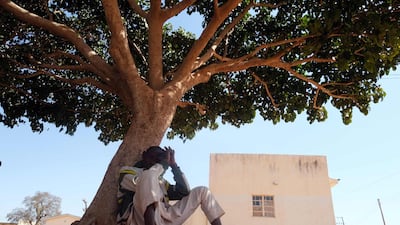It was 10.30pm when sporadic gunshots started ringing out in the sky over the village of Kankara in Katsina, northern Nigeria.
Farmer Garba Abubakar was with his wife and six of his 15 children, who were still awake when the shooting started.
By morning, Mr Abubaker, and scores of parents like him, were beside themselves with grief: his son Jafar, 14, who was staying at the nearby boarding school, had been kidnapped, almost certainly by Boko Haram, one of the most violent ISIS-linked groups in the world.
Three hundred and thirty three other children are still missing.
As dawn came, Mr Abubaker and other parents thronged anxiously to the schoolyard after hearing about the abduction, and later provided the school management with names, photos and other information that could help in the search of the missing school boys.
The 64-year-old said he was heartbroken to know his son is “out there in the hands of bandits who are not even making any demands”.
"The last time I checked, he was in school studying. No responsible father would be able to sleep ... I hope that my son returns soon,” Mr Abubakar said.
Rebels affiliated with Boko Haram claimed responsibility for the abductions last Friday, one of the largest such attacks in years, raising fears of a growing wave of violence in the region.
On Thursday, African conflict monitor Humangle posted a video on twitter, which it claimed had been filmed by Boko Haram. In the short clip, what appear to be scores of boys stand under armed guard in thick undergrowth, with one of the children addressing the camera, making a coerced statement.
But despite an assault by gunmen with assault rifles, in the chaos hundreds of children managed to escape the Government Science Secondary School.
The government and the attackers are negotiating over the fate of the boys, according to Garba Shehu, a spokesman for Nigerian President Muhammadu Buhari.
Two of Abdullahi Dantsoho’s cousins, Ahmed, 14, and Muhammadu Dantsoho, 15, and 13-year-old Usman Lawal, his friend’s brother, were abducted during the attack.
"The government is trying to downplay the number of abducted boys,” said Mr Dantsoho, 25, a student of the Federal University Dutsin Ma. Across Nigeria, there has been a public outcry over an alleged cover-up of the real number of missing children.
"What hurts the most is the government has lied about the number of missing boys. Why?” Mr Dantsoho said.
A twitter hashtag, #bringbackourboys – a nod to the #bringbackourgirls campaign after the mass Boko Haram kidnapping of 270 girls in Chibok, northern Nigeria in 2014, has become a rallying point for public anger.
A former student at the school, Aliyu Abba, 22, said the attack began with the gunmen arriving on motorbikes and shooting sporadically into the air before marching into a dormitory.
Mr Abba lives a few kilometres away from the school and was indoors when the attack started. The sporadic shooting created fear and confusion across Kankara until the military arrived.
Mr Abba said the Nigerian army arrived late to the scene of the attack, after which the boys who had fled and were hiding near by, returned.
He said the emotional condition of the parents, family and friends waiting for updates about the missing children is “devastating and disturbing”.
“We are wholeheartedly broken,” he said.
Boko Haram, notorious for the Chibok abduction – 100 of those girls are still missing – in February 2014, killed 59 boys in an attack on the Federal Government College Buni Yadi in Yobe State.
The terrorists are thriving in a region of poverty and lawlessness. Bandits have operated in the north-west region for some time, and kidnappings increased in recent years. Amnesty International says that more than 1,100 people were killed in the first six months of 2020 in violence related to attacks by bandits.
Security forces flounder
A rescue operation was launched by the army, with air support, on Saturday, reportedly leading to one clash with the suspected kidnappers. A terrorist hideout was reportedly located in the Zango forest.
Bulama Bukarti, an analyst at the Tony Blair Institute for Global Change, a non-profit development advocacy organisation, said threats from the bandits had not been taken seriously by the Nigerian government.
“The army is mired n basic logistical challenges and administrative bottlenecks, for example. There is a lack of equipment and the soldiers are few and can be easily overpowered during this sort of operation,” he said.























